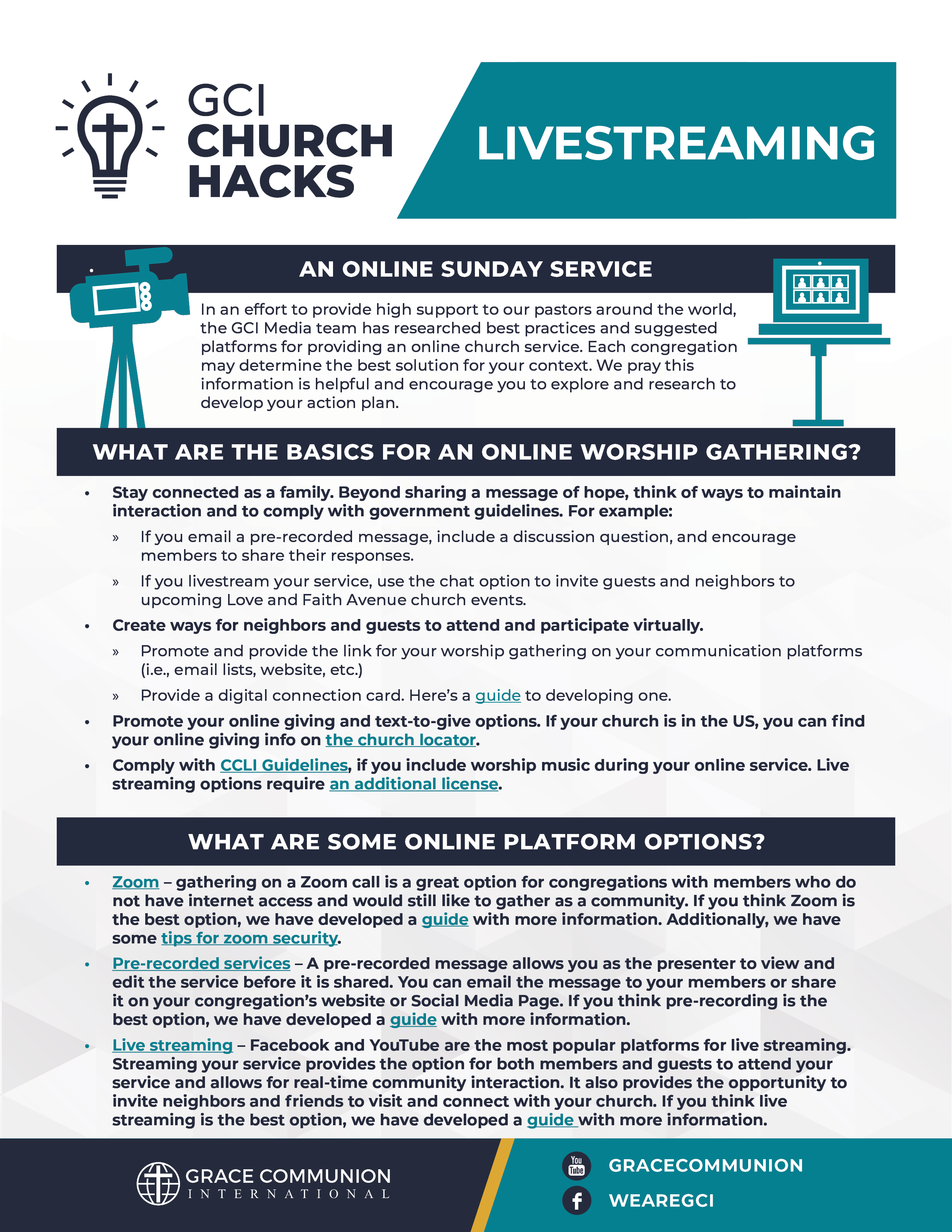Defining the 4 Es w/ Gavin Henderson
Welcome to the GC Podcast. A podcast to help you develop into the healthiest ministry leader you can be by sharing practical ministry experience.
Cara: Join GCI Superintendent of Europe, Gavin Henderson, and I as we discuss the 4 Es: engage, equip, empower, and encourage in this GC Podcast episode.
Cara: Hello friends, and welcome to this episode of GC Podcast.
This podcast is devoted to exploring best ministry practices in the context of Grace Communion International churches. I’m your host, Cara Garrity, and today I am blessed to have Gavin Henderson here with me, who is the superintendent of Europe and national ministry leader in UK in Ireland. Gavin is married to Sinead and has three children, ages nine, seven, and five.
They live in Market Harborough, UK, which is in the middle of the UK. And we are so glad to have you here with us today, Gavin. Thank you so much for joining us.
Gavin: Hi, Cara. It’s really good to be here too. When I got your invite to do the GC Podcast, I was actually listening to a podcast at the time, so it was quite exciting to have just been listening to a podcast and then get an email from you.
So, I’m quite excited to be doing this.
Cara: Yes. I love that. I love that. And I’m excited for this episode especially because we’re going to be talking about and defining the 4 Es, which is engage, equip, empower, and encourage. But before we dive into those definitions specifically, Gavin, could you talk to us a little bit about how the 4 Es connect with GCI’s vision of Healthy Church and why that’s important to us.
Gavin: Yeah, sure. So, with Healthy Church, I think a lot of what we’re trying to achieve with Healthy Church is to bring the practice of the church in line with the church’s theology because when the theology and the practice of the church are aligned, that’s really when we’re at our healthiest.
And I think this really plays into the 4 Es because one of the things that we’ve learned from our theology is the importance of being Team Based—Pastor Led. And we actually have seen how when you have Team Based—Pastor Led churches, you have this cycle of the Healthy Churches creating healthy leaders who in turn, then support Healthy Churches.
And I think that is a fundamental part of being a Healthy Church, is that you are not just thinking of your own needs, but you are raising up new leaders and new people to help and participate in the life of the church. And so, the 4 Es are really a rhythm of Healthy Church.
And I think sometimes we can make it very complicated. But if we think about our call as Christians to make disciples, really this is what the 4 Es is about. It’s about the multiplication of disciples which in turn helps feed into ministry leaders and the ministry itself. And I think this is a foundational part of the church. And obviously, the pastor has a key role in this aspect, but it’s not just the pastor’s responsibility.
Really, you want to see this going on throughout the whole life of the church—throughout all the Avenues, everywhere across the health of the church. You want to see discipleship-making. You want to see people not just turning up to church, but participating in the life of the church, growing in their roles in the church, and the church growing as a result of that.
I think the 4 Es are really a key dynamic of the Healthy Church and the Team Based—Pastor Led model, which is very much what we’ve been talking about for a while now in GCI.
Cara: Yeah, absolutely. And I love how you say, Gavin, bringing together and in alignment our theology and our practice and the life of the church, because that really is the 4 Es, like you said. It really is just living the life of disciples making disciples, the mission of the church.
And so that really is what we’re about. What a Healthy Church looks like is living according to the purpose of the church of Jesus Christ. And the 4 Es is just a framework that helps guide us to do that. I really appreciate how you put that. And it is something that is an important thing for us to look at, to help support us in that participation in the mission of the church.
I do want us to take a closer look at what we even mean when we say engage and equip, empower and encourage. Because sometimes we can say words, and we think we mean the same thing when we say them, but maybe we don’t. And so, let’s look a little bit at engage, the first of the 4 Es.
How do we define engage in the life of the local church, Gavin?
Gavin: I think engage is really quite a critical one. They’re all very important, but I think with engage, it really starts with relationships. And I think the root of engaging and bringing people into leadership or into roles in the church, you can’t skip the relationship stage.
And as you build relationships with people, what it’s really about is inviting them to be a part of what Jesus is doing in their life, in the church life, and in the world around them. And really, if we go back to the overall thing of what we’re trying to achieve, if we look at the Gospels, we look at how Jesus interacts with people, we see that he had relationships with his disciples. And very much the engage element, we can see in the Gospel passages themselves, where he works with the disciples and basically invites them to be a part of what he’s doing.
And I think that is a key part of what engage is about. So, it’s an intentional discipleship and recruitment. So, it’s not just building relationships, but it’s then recognizing people that you want to draw into intentional discipleship and then maybe recruit for a particular role, when you recognize some of the giftings they have, for example.
And part of this is recognizing that when we think of the church, when we think of the body of Christ, everybody is a part of the body of Christ for a reason. God has a plan for all of us, and he’s invited us into his church.
He’s called us into the church, and we all have a gifting and a calling and an invite into participation. And part of what engaging is it’s interacting with that invite into participation. It’s helping, drawing people into deeper discipleship, deeper relationships and roles within the church.
Cara: Yeah. Gavin, thank you so much. I really appreciate you mentioning the importance of the engage aspect of the 4 Es and how relationship-building is really foundational, and how we even see that in the life of Jesus and his earthly ministry. That’s so key.
It’s not just being entertaining or fun to be around, but it’s being relational in the way that we’re created in the image of God to be relational. And then drawing into a deeper way of being with people and being disciples, one with another and participating in what God is doing. And so, I think that is a really excellent way to be thinking about that engaged part of the 4 Es.
And so, if we think about defining engage in that way, the natural next question that I have is, who do we engage in that way?
Gavin: Yeah, so I think sometimes we can be too narrow in our scope over who we think should or should not be engaged. And I think it’s important that we keep our eyes open to what the Spirit is doing, not only in our lives, but in the lives of people are around us. And really, we can engage everyone to some degree.
But certainly, when we think of our church, there’s specific people in our church that sometimes we can see engage members and leaders to bring them into that next step of, in terms of discipleship and leadership. And sometimes, that’s exploring new areas of calling or along those lines.
But really, we don’t need to limit ourselves to that because we can also engage the people in our neighborhood, particularly when we think of missional engagement and engaging in the area of the Love Avenue, for example. Because often, there you are working with people in your neighborhood and we don’t need to wait until they become Christians before we build that relationship and start inviting them to participate in what the church is doing, what Jesus is doing in their neighborhood.
I think it’s important that we don’t become too narrow in the focus over who we can engage.
Cara: Absolutely. And what I think is really important in what you’ve said is, what God is doing is dynamic. His presence with us is dynamic. And we continue to discern as he moves in our midst.
And as you mentioned with maybe current members or leaders, maybe in a different season, he’s moving in a different way in their lives or in that church community and then in the neighborhood even still, he’s moving.
And if we come back to thinking about, like you mentioned, the life of Jesus in his earthly ministry, he just called people off the street, and said, Hey, follow me. And called them to participate in what he was doing. And then formation happened from there. Then incredible things happened from there, but that engagement happened in a way that we might think of, in our modern context, as a missional engagement in the neighborhood.
And so, I think that’s really key that you mentioned, let’s not be so narrow or think so inside the box of who we can engage, but always be engaging and having that ear to who God may be nudging us to engage in this particular way. And how is he drawing us in and how is he moving in our midst?
And you know what, one of the things that I think when we define these different terms is, it’s one thing to have a head knowledge, but it’s another thing to think about what it looks lived out, and real life with flesh on it.
And so, when is a time that you’ve seen engagement done well, Gavin?
Gavin: There’s one example that probably stands out for me, which is in relation to somebody in one of our Scottish congregations and his wife was the worship leader—is the worship leader in the congregation. And her parents were both very active in the church, but he was actually at the time not interested in religion, not interested in faith.
But what happened, because she would often be involved in preparing for the worship the next day, he started to give her a hand in helping her prepare the worship the next day, in terms of the technical side of things that needed to be done. And then over time, that extended to him coming up to set up at church for her the next day.
And then over time, he ended up staying for the service. And now he’s a very committed Christian, a part of the community. The key thing with that is the relationship was there. It wasn’t a shortcut, it wasn’t rushed.
But he was able to find himself being drawn into the life of the church. And that’s really what helped him understand who he was in Christ. And we may not always have as dramatic a call as that when we try and engage people, but I think it shows that sometimes we do think quite narrowly when it comes to engaging.
And when you do engage, and you recognize what people have to offer, certainly, that’s something that people appreciate, knowing that somebody has seen them and recognized what they have to offer. And I think that when it’s done well, when it’s engaged well, it can be very powerful when you see how the life of the person involved is transformed.
And there is a transformation that comes via the 4 Es. That, I think, is one of the exciting things about engaging this tool and mythology for the church.
Cara: Yes. And in the story that you’ve shared and even in part of how you’ve defined engage, what I think is important for us not to miss is in the relationship-building, the seeing of the person and what God has given them to offer, that really makes a difference. [Rather] than when we recruit just out of what we think is a need of the ministry or the church. Because then we can engage people out of a sense of, maybe I just need to use you as a gear in this machine versus who is God forming you to be in his church, in his kingdom?
And that’s where you see that transformation that you’re talking about versus I just need another chess piece on the board to keep this church programming going. And I think that’s a really beautiful example that you’ve shared, Gavin. Thank you so much for sharing that with us.
Gavin: Yeah. I certainly agree with what you’ve just said there, Cara. Because I think sometimes as well with the engage, if we only engage out of need, the problem is people can see it coming. If the only time the pastor speaks to you is when they need something, you see it as soon as they approach.
And that’s true of the worship leader. It’s true of all the Avenues. If the person is only approaching you because they need something, it doesn’t feel right, and people pick up on that. But if you have this relationship and if you approach them and recognize what they have to offer, then it’s very different from just trying to supply a need and people respond to that.
Because if you are caught up and you end up serving out of need, you always have that doubt in your head about whether you are really the right person for the job or whether you should be doing it. And that affects your whole outlook when it comes to whatever role you are serving in the church.
Cara: That’s a really good insight.
Gavin: That’s the first E. If we move on to the second E (equip), how can we define equip?
Cara: Yeah. So, when we think about the word equip, the Webster’s dictionary definition is supply with the necessary items for a particular purpose. And I think in this instance, that definition can actually help us with defining what equip means for us in the 4 Es within our Healthy Church vision.
Because when I think about equipping within the 4 Es and in ministry participation, Team Based—Pastor Led ministry, I think about it as like a holistic providing of experiences and tools and information or knowledge for the purpose of growing in participation in the ministry of Christ.
And really that’s discipleship, right? Growing in participation in the ministry of Christ is an important piece of the discipleship journey. And when I think about equipping, the reason I said holistic is that we are full beings. We’re integrated beings.
And I think often when we think about equipping, we can just think about maybe the head knowledge. What’s the information that you need to know to do something? But there’s also those hands-on experiences that are important to keep in mind when we think about how we’re defining equipping.
And so, I think the hands-on is also a really critical part of the definition of equipping—things like mentorship where you really get to live life-on-life and have that experience where that more intangible knowledge is getting passed on. It’s more getting rubbed off on you than passed down in a textbook thing.
Or apprenticeship where knowledge and skillsets are being passed along in a hands-on way where you’re actually getting to practice it in real life and not just learn about it from a workshop or a webinar. And you’re really getting to put these pieces into practice. I think that’s an important aspect of how we want to define equip in GCI.
And then we do have the things like workshops and seminars and tools that we have and knowledge that we need to know. And that’s all really important.
And if we stop there, I believe that equipping is incomplete because we haven’t had a chance to actually put flesh on it. And see what it’s like in motion. So, when I think about how we define equip, I think it’s the holistic piece of what knowledge and tools are needed.
And then, what’s that experience where that can be really owned by the person, [where] it can be really learned in a hands-on way?
Gavin: I think that’s spot on, Cara, because I think sometimes, we can just have this head knowledge. And it is useful having had knowledge, but often it doesn’t provide you with the confidence you need to go forward.
For me, for example, DIY [Do It Yourself] isn’t my strong point. But I do enjoy reading, and I can read a DIY instruction manual about how to do some plumbing or something along those lines. And even having read it, I don’t think I would ever go on and try it myself. If I watched a YouTube video, I might have a little more confidence, but nothing would be quite as confident as helping somebody else do that plumbing task, which would really give me that hands-on experience.
And it’s the same with ministry. You can read about something—and I think many Christians do read books, and we do want to engage in ministry and concepts like that. But it’s not always as straightforward because you are lacking that practical experience.
And if we look at the Gospels again and look at Jesus’ approach to ministry one of the things, he does is he includes his disciples. So, his disciples not just hear his teaching—of course, they hear his teaching but as they go along, they also are able to ask him questions and interact with him.
And then we see at key parts, he actually sends his disciples out so that they get that hands-on experience. Which is so important in terms of building your confidence that yes, you can fulfill this role that is being asked of you.
Cara: Yeah. Absolutely. And I think that’s an excellent example.
There are many things I would not try after just reading a book or watching a YouTube video. And there’s a lot of things that I wouldn’t want somebody else to try for me or on my behalf after just reading a book or watching a YouTube video. And of all things, the holy privilege of participating in the ministry of Christ—would we not want to equip and be formed by the Holy Spirit well and create spaces to do that in a participatory, holistic hands-on way?
And as you said, it is similar to the way that Jesus modeled it in his earthly ministry. Absolutely. That’s an excellent example.
And so, as we’re equipping, according to this definition or understanding of equipping, how would you get a sense for whether equipping is being effective or whether we’re seeing fruits of the equipping that’s taking place?
Gavin: When you think about equipping and whether it’s being effective, it does depend on the specific area of service or the ministry role that is being looked at. You can’t necessarily have a one answer that fits every role to this question. But really, I think the biggest indicator that you have is when you see transformation taking place in the person, when you see that they’re growing more confident in their role, when they move from that period of just following instructions to really making it their own.
When you see the innovations start to come. And I think that’s really exciting. What you’re seeing is somebody responding to the calling and participating in what God is doing in their midst. And it’s beautiful to witness that in a person. And we have the Apprentice Square tool that we sometimes use, which is talking about how we gain new knowledge and become more competent as we move around.
And I think that tool is quite helpful when you take the time to understand how to use it, to really understand about how we grow when we are learning a new skill or a new area of development. And what we want to get to the point is when somebody is both consciously and unconsciously competent.
I think you can see it when you arrive at that. But it’s about helping people as they travel along each side of the Apprentice Square. Because at each side, they need a different level of support from whoever’s training them up. But really, I think you see where it’s most effective when you see the innovations start to come—the flavor and the gifts and the personalities that are unique to that individual. When they start coming through in that area, not only is that very exciting, but it’s also when I think it’s at its most effective.
Cara: Yeah, absolutely. I think those are fantastic signs for us to be keeping an eye out for, that the equipping that’s being provided is the right equipping. Because you mentioned, specifics to the area of ministry or where somebody’s serving. So, are we providing helpful equipping for the task at hand or for that particular purpose? And is it being effective?
Is it helping that person to grow first and foremost as a disciple of Christ? And secondly, in that particular way that they’re being asked to participate in ministry for that season. I think those are great things for us to be on the lookout for.
And when we don’t see those things happen, sometimes equipping takes time. It’s not overnight. And sometimes it’s also okay to say, let’s try something different, right? Everyone does learn in a different way. And we are learning even how to be learners, to be equippers.
And so sometimes, it’s also okay if we’re not seeing some of these signposts of effective equipping, to take a moment to pause and to say, okay, if we think about equipping as defined in this way, how can we recalibrate and come forward to think differently or try something new with this?
I’m wondering for you, Gavin, and in your own experience, when there’s been a time that you’ve been equipped particularly well from ministry participation and what that experience was like for you.
Gavin: I think one of the things you were touching upon there is that when people are being equipped, the equipping has to come in stages to some degree. And if you try and give everybody everything they need to know at once, they just feel overwhelmed. And again, this is where the Apprentice Square is helpful to go back to.
Sometimes, you have to make sure that your equipping is matched to the individual. One of the areas as we think of starting off in ministry participation, I was very blessed in growing up to have a father who was a minister. And in many ways, where I feel I was equipped for ministry was actually through just riding along with my father as he went on ministry events and visits.
And a lot of the time, it wasn’t even in my mind that I was being equipped. It was more that I just wanted to spend time with my dad. He wanted to spend time with me. But inevitably, [I] would go along and I would witness what he would do in ministry.
That was very helpful for me in terms of equipping me, particularly where I was at the stage then. At that stage, I didn’t know I was going to end up a minister; my dad didn’t know I was going to end up a minister either. But I think it gives you some idea about how you can be equipped even through fairly simple things like just accompanying somebody and spending that time when you’re doing your job with someone. Because I can see looking back, how helpful that’s been in terms of my own ministry, giving me confidence about what ministry involved and the approach to take.
Because sometimes I think with ministry—and again, this is very specific, me for example—is that the tone that comes across when you are with somebody who’s just lost a loved one is really important, more than necessarily having the right words. Because the truth is, if somebody’s just died, there aren’t necessarily the right words that you can say to them, or all you can do is point them to Jesus Christ.
But your attitude, how you approach it, that’s what’s really important—the tone. And that’s not easily something, you can describe. But in many ways, I feel more equipped for some of these roles just because I was able to participate when my dad was involved in those kind of ministry areas.
That’s a personal one for me, about my own experience of, in some ways, how I was equipped for this role. And I think it’s a good example because, again, that’s one that, in some ways, isn’t too “in your face,” too much of an ask, but is a great starting point.
Just come along with me and see what I’m doing. If you invite somebody just to see what you are doing, it can help them understand and take away some of the fear about what they may be asked to be doing or what may be asked of them if they take on this.
Cara: Yes. Thank you so much for sharing that because I definitely agree that “come and see” can absolutely be one of the most powerful forms of equipping because it’s that opportunity for that mentoring, that life-on-life, to see in real life, what does this look like? What does this mean?
That’s really a good word. And I praise God that you were able to have that experience. So, thank you for sharing that, Gavin.
And so, then we next move to the third E, which is the E that I personally live for. I love this E. It is the empower one. So, what does empower look like in the life of a local church, Gavin?
Gavin: Empowerment is a really important one for me because I’ve seen it happen where I’ve seen people who have been engaged, who have been equipped but then they haven’t been empowered for the role. And I’ve seen the frustration that’s caused an individual and the difficulty it is.
And I think when you’re empowering, one of the biggest things to think about is this idea of creating space for meaningful ministry. Now what do I mean by creating spaces? That if you train somebody up and develop them and equip them for a certain role, they need to be able to practice that role in a way that allows them to make it their own.
And sometimes this can be a difficult one to manage the transition of, because what you need to do is you need to have somebody step back so the other person can step into the role to some degree. So, it is not just delegating the role to somebody, it is giving them a sense of ownership and responsibility for the role that we are wanting them to take on. That’s really important.
When we think of creating space, there’s creating the space, but then you also have to help other people understand this person now has this space and is now involved in this meaningful ministry here. And often to do that, I think it’s helpful to commission the person so that there’s a recognition by others that this is an area in which they are now in leadership.
An example that I find is quite helpful in this is, in most churches—not necessarily all—there are sound desks to amplify the sound. And often, when you’re having somebody working the sound desk you can train them up in all the equipment, but they really need to start using the skills you train them in, and they’re equipped with. Otherwise, those skills will start to disappear over time. The confidence they have will disappear.
If you put them in that role, whoever was currently doing the sound system clearly has to step back from that role. And then at the same time, if everybody thinks the other person’s running the sound desk and nobody comes to the new person, then it’s just going to create problems.
I like the sound desk as a model for this one because I think it’s an easier one for people to see. But the reality is for almost any role in the church, you have this similar situation going on where you have to create space for what the person has been equipped to do now.
And the commissioning really empowers other people to see this person, to see the skills they have, to see that it’s recognized by the church. And that they basically are empowered to take the lead in this particular area. And I think this is such a critical stage when we think about the development of new leaders in the church, the concept of discipleship.
Again, to go back to the model we have in the Gospels and in the Book of Acts, we see that in many ways, this is what Jesus does. He had them come alongside him. But also, in many ways the whole point of Pentecost is it was this commissioning of the disciples to go out and to share the good news.
And the space had been created for them to do that because Jesus has called us to participate in what he’s doing, his ministry to his world. And this is the great gift we have been given by Jesus Christ—is that we are able to go out there and share the good news, the good news of Jesus Christ.
It’s not just that he kept the good news to himself, but we are able to be heralds. And that’s really exciting. But we see, again, in that biblical model, there is a creating of space and there is a commissioning. So, as we go through these 4 Es, you really see that we’re following a biblical model forum, but at the same time so much of it is about how we take these concepts and really apply them to the life of the church.
Cara: Absolutely. And what you’re saying, what I think is really important and why I love the empowerment E is this idea that we’re not just creating “mini me’s” to do things exactly how we would do it or to do the things that we just don’t quite have enough time to do, but we wish we did.
But like you’re saying, creating real space. And then actually commissioning people into that space in a way that is really meaningful. Releasing them to be led by the Spirit according to their own giftings and what God is doing in their life, in their midst. Freeing them to respond to God on their own, not according to how I would, or how I would want them to.
And still with responsibility, but not with this idea that you have to do it exactly the way that I would do it. So, I think that is an excellent definition that you’ve given us of empower, Gavin. Thank you really for that.
Gavin: So, what do you think, Cara, are some of the things that might tempt us to settle for a lesser definition of empowerment?
Cara: You mentioned this, and I think this is one of the things with this E that trips us up sometimes, is we do the engage, and we do the equipping, and then we maybe fall short on empowerment or settle for something a little less than this empowerment that we’re talking about. Where maybe someone can do the thing that we’ve equipped them for, but they don’t have full responsibility over it.
I love the example you gave of the soundboard where you have the skillsets, but you’re not fully able to put them to use or you don’t have the full responsibility or authority to lead in that capacity, in that area of ministry because the previous leader hasn’t stepped aside.
I think that’s something we experience pretty frequently in the lives of a local church. And I think that we are selling ourselves a little bit short of what we could experience in terms of vibrancy and health in our church communities. There are a number of things that always could contribute to why our decisions come out the way that they do and what that looks like.
But I do think there are some common things that we can keep an eye out for that can really help support us in rising to this level of a definition of an empowerment.
One of the things that often will happen is, when we have a lack of effective equipping then we see or identify a lack of competency in an area. And then we’re hesitant to fully empower, right? Because we’re like maybe I can’t give this space and commission this person to have full responsibility over this ministry because they don’t quite have all the skillsets that they need right now.
To me, that’s an easy fix. Rather than just settling for a “mini me” or someone to just manage some tasks or do some delegation, we can just instead provide fuller equipping, holistic equipping so that person can fully step into a meaningful area and space of ministry that’s in line with their gifting and what they have to offer the community of the local church.
So that comes back to the equipping stage. Has that been robust enough to move on to the empowerment stage or have we rushed through?
And then sometimes I think that we can have a little bit of a lack of relationship, which leads to a lack of trust. We’re not going to necessarily empower and give over responsibility to somebody in an area of ministry if we don’t know that we can fully trust them.
And so that comes back to really what you said right at the beginning of our conversation, Gavin, that relationship is foundational to the engage stage. And so how have we thoroughly engaged? Have we built strong relationships before going ahead and saying, oh maybe you can lead this?
Have we built relationships that are hardy enough that we can actually trust people to be empowered in areas of ministry participation and leadership?
And I think both of those things come back a little bit to, we have a desire to control, right? I think that’s in a lot of us as people. But ultimately, it’s Jesus’ church not our own. And as you said at Pentecost, we’ve been empowered as his church to preach the gospel.
And I think that’s a bit of a mind shift for us to take. Do we trust? Can we trust more deeply what God is up to in our midst? And can we trust in this idea of the priesthood of all believers, that he’s calling all of his people into meaningful participation in his ministry? And that might require of us creating space and empowering others to do just that, to participate in that ministry.
And then I think that the last thing that can be a barrier to us fully rising to this awesome definition of empowerment is even misunderstanding life stages and capacities or capabilities at life stages.
So, I like to think a lot about younger folks, youth and young adults and what they’re capable of. I think that they’re capable of a lot more than we often give them credit for. And so sometimes there can be a hesitancy to empower emergent leaders because maybe they’re too young. Maybe they can’t handle this level of responsibility, but when they’ve been well-engaged and well-equipped and are well-supported in doing so, I think that’s one thing.
And then on the other end of an intergenerational church life perspective, I think sometimes when folks get into their senior years, we don’t think about the ways that they can still meaningfully participate in ministry. So just because you can’t go out and walk three miles going door to door getting to know your neighbors, doesn’t mean you can’t write notes or something like that, and be empowered to have a participation and encouragement note-writing ministry or something like that, just as an example.
And so, I think, again, it comes back to: are we thinking too narrowly about how God is working in the people in our community and in our neighborhood? Or are we open to what people have to contribute to the life of the church?
And so, I think that those are some things. Now, there could be others, but I think those are some key things. When we let those be barriers and we’re like, oh, okay we can empower people by maybe letting them hit advance on the slide a couple times and then we’ll call that empowerment.
But I think we’re selling ourselves a little bit short, if we let ourselves off the hook and say that’s empowerment. When I think, by the power of the Spirit, God has called us to something really incredible to participate in his ministry in the priesthood of all believers.
Gavin: Yeah, absolutely. I think one of ones there that I’ve had some experience with is, I think often the barrier to empowerment can sometimes be, we use the term control, but I think it’s more a fear-based mentality of fear of letting go of something for what might happen as a result of that.
And sometimes it can even be the pressure we’re under because sometimes if you’ve been working in ministry, and you’ve been accumulating roles along the way, you reach a point where you really are at capacity and you really need to hand things off. But sometimes that’s easier said than done for you.
Because of your fear about having to train somebody up, the amount of time it would take, it’s so often to end up with that mentality. It’s easier for me to do it myself than to train somebody up to do it. That only makes sense really in the short term. It makes no sense in the long term, but those are very easy mentalities for us to adopt in the moment because if you find yourself pressured or overworked which can happen because most ministry are volunteers. Most ministry workers are volunteers. And often you have your day job, you’ve got your family life, you’ve got all sorts of things going on, perhaps even health difficulties or whatever.
And so, you can find yourself in this stage where you are just really overwhelmed, and it’s easy for you to keep saying to yourself, it’s easier for me to keep doing this myself than to finish off handing all this over to the other person. But that’s just really a trap, and if we carry on that way, there’s no way out.
And I can certainly voice my own experience of sometimes finding myself trapped along those lines. And really the only way to break free, to have that freedom, to have that liberation, comes from letting go and trusting others. And particularly, sometimes you can feel it difficult to trust when you’ve been burned in the past.
And I think this is one of the things that sometimes does happen in development and discipleship. Perhaps you’ve been working with somebody in the congregation and training them up for a particular role, and they get trained in that role. And you empower them, and you commission them. You create space, and they’re great at it.
You’re encouraging them, and then they get a job in another city, and they move away. And it’s heartbreaking, in a way. But at the same time, sometimes that’s part of life and particularly part of the Christian life that we’re called. And we need to just trust God that the skills we’ve helped that person with are going to be helpful somewhere else down the line.
But we can’t really put “all our eggs in the one basket” concept. We need to understand that the reality of life means that sometimes people will move away to another city, or they’ll have a family emergency. That means they need to step back. And this is why at the same time, it’s so important that we keep going with the 4 Es because what you really want to reach, the point you want to reach in a Healthy Church is where not everything is depending on one or two key people that you have, redundancy in the system, so to speak.
So that if something goes wrong, there are other people who are able to support and help out. And this is why Team Based—Pastor Led is one of the hallmarks of being a Healthy Church is that you have a system that’s able to deal with that. But to do that, you really need to lean into these concepts.
Lean into engaging, equipping, empowering and—as we’re about to go onto—encouraging others. So, let’s move on to encouragement.
Cara: Yeah, absolutely. And thank you for those excellent points, Gavin. And as you said, encouragement, this is our final of the 4 Es.
And it can seem, oh yeah, that’s an obvious one. That’s simple. We all encourage, we’re good Christian people. Of course, we encourage, but we want to not miss how important this is when we’re talking about developing others, discipleship, and the rhythms of a Healthy Church and the life of a Healthy Church.
Because encouragement is something that, again, it comes back to not just a pat on the back of, oh yeah, good job, kiddo. But are we seeing people, right? Are we seeing them well? Are we seeing and taking the time to discern what the Spirit is doing in their lives? Maybe how they’re growing and transforming, how they’re contributing to the life of the church, the ways that the life of the church and the neighborhood are more like the kingdom because of who God is shaping this person to be and how they’re contributing.
And so, I think that on a practical level, encouragement is how we define that, as continuing to speak life into that person and continuing to see them and name what God is up to, what we see them doing. And I think to be specific with encouragement, I think that’s one best practice of encouragement, not just, oh yeah, you’re great, that’s so wonderful.
If you could say it to everybody in the church, is that really encouragement? But if it’s something specific, that is specific to that one person, who they are, who God is shaping them to be, the ways that they’re participating in the ministry of Jesus and that particular season of their life, in that neighborhood, in that local church, that’s really meaningful. That’s a way that we get to participate even in Jesus’ ministry of seeing people, of speaking life into them.
And then, to bring that encouragement consistently. And I don’t mean—it doesn’t have to be every five minutes consistently, but if somebody’s been serving, participating in a particular ministry role for two years, I think it’s easy to, maybe we encourage them for the first four months. But then at the end of year two, maybe we just take it for granted that they’re doing a great job. So, are we continuing to see people, to speak that life into them?
And then, to do that in a way that is unique to them as well. How do they hear encouragement? How [would] they be encouraged? And not just to speak life in the way that we like to speak life, but how does that person receive life and encouragement, I think is something that is helpful to consider as well.
Gavin: Yeah, I definitely agree with that because people do receive encouragement in very different ways.
I think there are some people where being recognized publicly means a lot. There are other people where, they just don’t want to be recognized publicly. And if you put them on the spot, they’re just embarrassed about it. And I fall into that latter category.
And this one, encouragement, for me is always one that I think that I need to focus on more. I don’t feel it’s one of my natural strengths. I wish it was. It seems sometimes crazy that encouragement isn’t, but it just doesn’t naturally come from me, as my wife is very good at reminding me.
But one of the things with encouragement that I think that I’ve learned as well is that sometimes when you’re in a leadership position, you have people come to you and say, didn’t so and so in the congregation do a fantastic job? And sometimes we need to stop and say, “They did. Have you told them that?” Because sometimes the encouragement that’s needed isn’t just from the pastor; it’s from the congregation. It’s from the community, the wider people around. And what you really want is a culture of encouragement where everybody is looking to encourage one another—again, with specifics and consistent there.
But if it’s just one person in the congregation doing all the encouraging, then it ends up looking like that person’s gifting as opposed to real encouragement, if that makes sense. So, I think it’s important that this is viewed not just through the pastor led lens, but through the team-based lens as well.
That really with the 4 Es, when it’s working together, you’re not talking about one person who’s doing all this element. You come back to that team-based element, and the encouragement is one where that’s easier to see to some degrees, but it also carries more weight when the whole team recognizes somebody for their contribution.
Cara: Yeah, that’s an excellent point. Creating a culture of encouragement and bringing everyone’s voice into that. That’s excellent. As we begin to wrap up our time today, Gavin, what encouragements would you share with those who are learning to put the four E into practice with their teams and in the life of their local churches?
Gavin: I’ll tell a story. I gave a presentation to some of our ministers here in the UK on the 4 Es. And unbeknownst to me a couple months later, one of the ministers was doing a quiz in the church, and they put this up as one of the questions about the church to see whether anybody could name all 4 Es.
And it was clearly an issue for everybody to remember all four of the Es. People kept getting three of the Es, but they couldn’t remember that last one. And it was just quite amusing watching everybody struggle with that. And sometimes I think at times, we can almost be put off by some of the buzzwords and trying to remember all these little things.
I think it’s so important that we understand the value that comes out of this tool that we are discussing. And it is tool. We need to think of it in the context of being a tool to help us, to help us to develop good habits when it comes to developing up new leaders and multiplying leaders.
So, for some of the people that I think who are just beginning, what I would say is, it’s worth persevering with these concepts. Don’t expect to just read it the one time and think that you can come away with it. You need to really stop and let it expand in your mind. And think about, what does it mean to engage with people with respect to the 4 Es? What does it look like when you recognize the giftings in an area?
And then, how do you go about perhaps recruiting that person to a specific role? What does, equipping them look like in that particular context? And that’s really where you get the value. So, to some degree, you get more value out the 4 Es the more effort you put into developing these concepts in your own mind.
And that’s really what I would say to people who were just beginning with this. Persevere. The terminology is there to help you understand these key concepts that we’ve been discussing today.
Cara: Thank you so much, Gavin. I really appreciate all the insights that you’ve had to share with us today. They’ve been really helpful, and I’m sure that they will be helpful to all of our listeners.
But before I let you go, we have a little bit of fun to have. So I’ve got a couple of fun random questions that you can answer with whatever comes to mind first. So, if you’re ready, here we go.
Gavin: Okay. I’m ready. I’m ready.
Cara: If you could instantly become an expert in something, what would it be?
Gavin: The immediate thing that came to mind was medical stuff. I have no idea why that came to mind. Yeah, I don’t know. I guess at one point in my life I wanted to be a doctor. I think that ship has sailed. I don’t know what I would do with all that knowledge if I had it now.
Yeah. Maybe we want the next question.
Cara: That’s a good thing to have immediate expertise on. People pay a lot of money to get that expertise.
Gavin: That’s true. That’s true. Yeah. So, I would just skip quite a lot of years of learning there. That’s true.
Cara: That’s right. All right. If you have to sing karaoke, what song is your go-to song?
Gavin: I’m very musically challenged; I’m going to put it that way. And I really do struggle with music, and I have two specific things that I struggle with. One is that I can’t keep rhythm at all. I’m one of those people that when people are clapping along with songs, I can’t do it.
I’ve worked out that I can read the lyrics for a song, and I can sing the song at the same time, but I can’t read, sing, and clap at the same time. If I want to clap in rhythm, I really need to be watching somebody else. Otherwise, I don’t keep the rhythm. The other problem I have is that I just genuinely am not very good at remembering lyrics to songs.
I’ve practiced this over time. I had specific songs that I would sing to my children. When they were growing up, like nursery songs and I would be there when I’m singing to them, reading them off my phone. And I read some of these songs and sang them every day to my kids every night for a couple of years.
And I’m shocked now when I go back to sing them how little of those nursery rhymes that I can remember. So, I’m going to duck that question because I tried to do karaoke once and it’s a pain. I’m not looking to repeat.
Cara: Yeah. So, you’re a non-karaoke-er. Yeah. That’s all right. That’s all right.
Gavin: I enjoy watching other people, yeah. If they’re good.
Cara: We can’t all be gifted in everything. No. All right. This next question, I know you’re gifted in this. What is your favorite meal to cook?
Gavin: Ooh. See my favorite meal to cook is probably always the next one because one of the things I really enjoy doing when I’m cooking is—part of it is the excitement of trying to find a new recipe I haven’t done before, something that looks exciting.
And so I always enjoy that next meal that’s coming up because part of the enjoyment I get, particularly as a cook, it’s not just, you want the meal to be good, you want to enjoy eating it, but for me, I like the whole process and including that planning process where you’re working out what to cook, and then you’re getting the ingredients, then you’re actually making the recipe.
And for me that planning element is the one that I like the most. And it’s not specifically one recipe every time that I turn to it and it’s my favorite, it’s more that I enjoy the experience of learning about a new cuisine or a new dish, or particularly if there’s like a new ingredient I haven’t heard of.
That’s what I find very exciting.
Cara: Okay. Yeah, that’s a lot of fun. All right, this next one, what’s the best phrase or piece of slang that people in your hometown use?
Gavin: Oh, this is a difficult one.
The challenge for me here is I don’t really like using slang phrases. I even struggle to use nicknames for people because it’s not that I have anything particularly against it, it’s just my personality doesn’t really lend itself to that.
Cara: Ah, fair enough. Fair enough. Sorry.
Gavin: I know that’s not the easiest answer to give there, but I’m struggling to think of anything, but
Cara: No, that’s okay. You’ve answered to say, you’re not a slang kind of person. That’s your answer.
I was looking forward to some good British phraseology, but that’s okay.
Gavin: I’ve probably given you some already. When I was talking about DIY and plumbing earlier, I was going to say changing the tap, but you say faucet and I thought, oh, okay, maybe I won’t use that.
Cara: That’s right. That’s right. And then our last question, what’s something that always gives you childlike joy?
Gavin: What is something that always gives me childlike joy? I actually really enjoy playing tricks on my children and my wife too. And I have to say, nothing gives me more joy than when I really get them with whatever particular trick or prank I played on them at the time.
So that would definitely be my answer then.
Cara: That’s awesome. I love that. Oh, goodness.
Thank you so much, Gavin, for joining us on the podcast today. We had a really rich conversation, and I hope that our listeners are able to gain some great insights from it. It is our practice with GC Podcast to end the show with prayer.
So, would you be willing to pray for our churches, pastors, ministry leaders, and members in GCI today?
Gavin: Of course, I would. Yeah, let’s pray.
Thank you, Heavenly Father, what a joy is to be able to come before you. And Father, you are the source of all good things in our life and let us never lose sight of that.
Let us never lose sight of all the amazing and wonderful things that you’ve done for us. And Father, we’ve talked today about how we can step into greater participation, into what you are doing in our lives, and in the life of our church, Lord and Father. As we think about the 4 Es, as we think about discipling others, Lord, we just always ask that everything that we do be to your glory, Lord, that you guide our steps, that you help us in the decisions that we make.
And Father, as we think about the churches we have here in GCI and the pastors and the ministry leaders and the members and Father, we just ask that you help us all to draw closer to you. Let us clearly fix our eyes on Jesus and follow him wherever he is leading us, Lord. And so, Father, we place our trust in you.
And we just ask that whenever we use these tools, whenever we have these discussions, that we always use them, remembering your son, Jesus Christ, remembering the good news that we have through him, Lord, that we are called to be his witnesses to the world, Lord.
So let us go out into this world. Let us be his witnesses, and let’s proclaim the gospel, the good news of Jesus Christ. And we say this in the name of your son, Jesus Christ, and through the power of the Holy Spirit. Amen.
Cara: Amen. Folks, that’s all we have for today. So, until next time, keep on living and sharing the gospel.
We want to thank you for listening to this episode of the GC Podcast. We hope you have found value in it to become a healthier leader. We would love to hear from you. If you have a suggestion on a topic, or if there is someone who you think we should interview, email us at info@gci.org. Remember, Healthy Churches start with healthy leaders; invest in yourself and your leaders.



 By Pastor Bob Regazzoli, Australia
By Pastor Bob Regazzoli, Australia
 By Bill Hall, National Director, Canada
By Bill Hall, National Director, Canada
 By Glen A Weber, U.S. Central Regional Support Team
By Glen A Weber, U.S. Central Regional Support Team
 By Danny Zachariah, National Director India
By Danny Zachariah, National Director India








